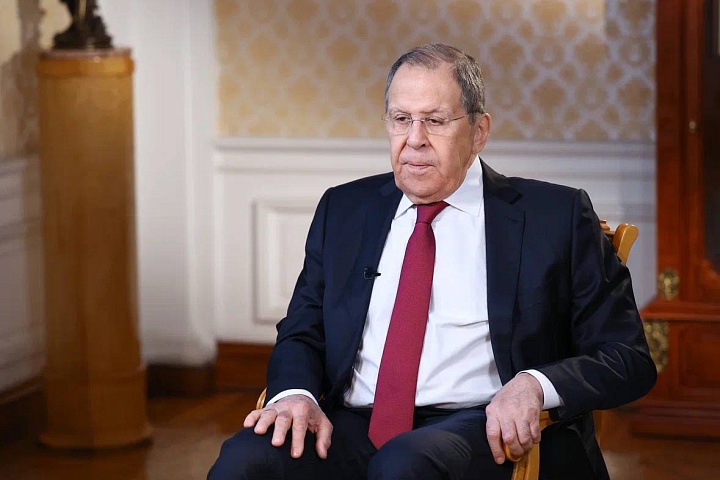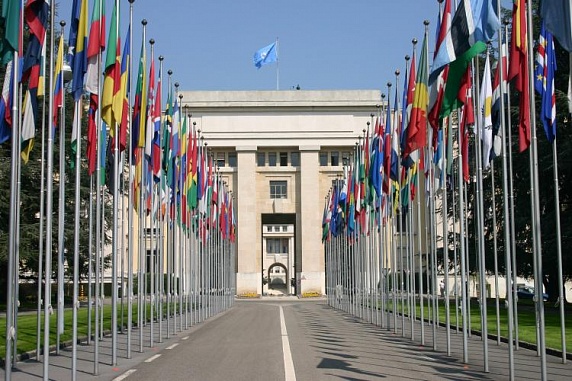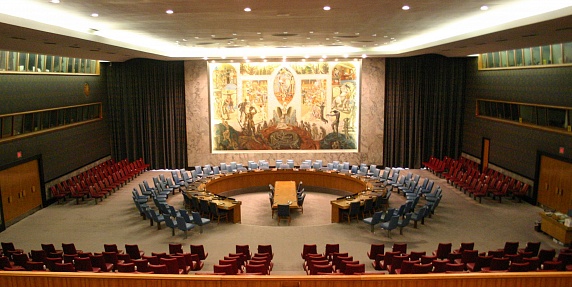 ONU
ONU
Excerpt from Foreign Minister Sergey Lavrov’s interview with Channel One, Moscow, March 25, 2025
Question: Talks in Riyadh are important. What was their objective and what is the outcome? Please share your thoughts on this.
Sergey Lavrov: The outcome is that the preliminary results are now being reported to President Vladimir Putin and President Donald Trump. As the presidents agreed earlier, the participants focused primarily on safe navigation in the Black Sea. This is not the first time they are trying to address this matter.
The first attempt dates back to July 2022. Back then, UN Secretary-General Antonio Guterres and President of Türkiye Recep Tayyip Erdogan mediated with the specialists who represented the Ukrainian and Russian entities in question and came to terms on a certain package that was made up of two parts. The first part provided fast-track solutions to shipping Ukrainian grain across the Black Sea via the straits that included ship inspections to preclude cheating where empty runs for a new batch of grain could be used to deliver weapons.
Inspection procedures have been agreed upon and remained operational for the entire year. However, we were then forced to suspend the process, at least to pause it, because the second part of the deal that concerned removal of all obstacles to Russian grain and fertiliser exports was flat-out sabotaged. All ships that carried Russian agricultural products, including fertiliser, have been blacklisted. Lloyd’s, the insurer, has hiked up the rates. Payments for our products were impeded as well. Rosselkhozbank was disconnected from SWIFT. Much was done to send prices sky high. European farmers created unfair competition. However, our Western colleagues acted in a biased manner and dumped substandard Ukrainian grain on European markets.
The West was doing everything to skew the rules in favour of Ukraine and to punish the Russian Federation as much as it could.
A year after the Black Sea Initiative had taken effect, UN Secretary-General Guterres threw up his hands and said that he was unable to get things right. We suggested getting back to this deal whenever he regains this ability. We just bailed out from the Ukraine side of the deal which was approved to last one year. The year ran out. We did not renew that deal. The Memorandum of Understanding between the Russian Federation and the Secretariat of the United Nations on promoting Russian food products and fertiliser to the world markets - Russian grain and fertiliser exports make up a much larger share of the world markets than Ukrainian - will remain in effect through July 2025.
UN Secretary-General Antonio Guterres and his representatives maintain contacts with us at all times and are trying to help. However, they are not trying to have sanctions imposed on us lifted, and are nor demanding that the West - if it genuinely wants to advance the interests of developing countries, the Global Majority, primarily Africa - cancel its discriminatory food security policies.
UN Secretary-General Guterres chose another path and started looking for loopholes in the Western sanctions without demanding to lift them altogether. Moreover, in fact, he did so while complying with these sanctions and acting upon them, which is absolutely unacceptable for any UN official, even more so for the Secretary-General. The UN Charter says that no member of the UN Secretariat, including the Secretary-General and his deputies, can receive directives from any government. If the UN Secretary-General is looking for loopholes with regard to sanctions, thus recognising that they exist, he is, in fact, acting upon the decisions that are made in the capitals of UN member states, which is something he cannot do.
That is why our negotiators in Riyadh, who were assigned for this mission by President Putin, reminded their US counterparts of this incident and said that, given Ukraine’s track record and the Black Sea incident in question, we would like to leave ambiguity out of whatever agreement we may reach this time.
We also noted that when the Ukrainian part of the initiative expired in 2023, and we withdrew from it, President of Türkiye Recep Tayyip Erdogan tried to renew it on two or three occasions. A year ago, he asked for our support to fast-track the renewal of the initiative without conducting physical inspections of empty ships after grain and fertiliser get unloaded. We were willing to meet them halfway even then. Then, at the last moment, President Erdogan said Vladimir. Zelensky still wanted to reach an agreement on not targeting nuclear infrastructure facilities, even though Zelensky was the only one to attack Zaporozhskaya Nuclear Power Plant. Considering the fact that this proposal came from Kiev, we agreed to it without recurring to any special verification mechanisms this time again. In other words, we met all President Erdogan’s requests, including the one that Zelensky slipped to him at the last moment for purposes that remain unknown. We agreed to it. Later, President Erdogan called President Putin and said Zelensky had a change of heart.
Every time a ceasefire was declared, Ukraine agreed to it solely because it found itself in desperate straits on the battlefield at that particular historical moment. A few weeks or a couple of months into the ceasefire, they grossly violated it. This is how things were throughout time the Minsk Accords were in effect.
That is why this time we need clear, concrete, verifiable, and workable guarantees and mechanisms. As President Putin said at a news conference with President of Belarus Lukashenko a few days ago, he was supportive of President Trump’s initiative to declare a ceasefire for 30 days, not just a moratorium on strikes on energy infrastructure or on maritime infrastructure in the Black Sea. He said we are all for it. However, considering the length of the contact line, the ability of the Ukrainian military to stage provocations...
Recently, they attacked the Sudzha gas metering station and claimed Russia did it, even though the station is our property, and a number of European countries largely depend on it for uninterrupted energy supplies. It is impossible to do so now, just as it is impossible to use the Caspian Pipeline Consortium, in which Kazakhstan and the United States have business interests. One of its pumping stations – Kropotkinskaya - has come under attack. The damage it sustained cannot be undone quickly. The volume of oil pumped to European households will drop dramatically because of this terrorist attack by the Ukrainians.
President Vladimir Putin said Russia was in favour of a ceasefire, but there were nuances such as who would make sure that the Nazi regime in Kiev cleans up its act. We are also in favour of exploring ways to prevent causing any damage to the energy infrastructure which is not in our interest. As the President said, we are in favour of resuming the Black Sea Initiative in a more acceptable form, and it was discussed in Riyadh as a top priority.
Our position is straightforward, and I have just outlined it in broad strokes. We cannot take this individual’s word for it. We want the grain and fertiliser market to be predictable, so that no one tries to make us leave it. It’s not only because we want/wanted to generate a legitimate revenue in fair competition, but also because we are concerned about food security in Africa and other countries in the Global South and Global East that are impacted by the West’s unscrupulous competition tricks. Prices there are quite reasonable, but they could have been much lower if the West stopped interfering in the free play of market forces that it worshipped when it lured us all into this “realm of globalisation and freedom.”
As I mentioned earlier, we will need clear-cut guarantees. Given the disappointing experiences of our past agreements with Kiev, the guarantees can only exist in the form of a directive coming from Washington to Zelensky and his team to do so and so and not otherwise.
I think our US partners are receptive of this signal. They realise that Washington is the only party that can achieve positive results in putting an end to the terrorist attacks and the shelling of civilian energy infrastructure that is unrelated to the defence industry.
Europe went down a completely different path. Like in the times of Napoleon and Hitler, the times of the Crimean War, it is eager to inflict a “strategic defeat” on our country. As back in those years, almost all European countries with few exceptions are involved in the war effort. They are not yet physically fighting against us in Ukraine, but, without them, Ukraine would have been defeated, and the Nazi regime would have ceased to exist a long time ago.
As they continue to flood Kiev with weapons, London and Paris - especially its two leaders, British Prime Minister Keir Starmer and French President Emmanuel Macron - backed up by a not too strong coalition of the Baltic states and a number of other countries, keep talking about shipping weapons to Ukraine as they did before, and are even talking about forming a “coalition of the willing” and deploying a “peacekeeping mission” or a “mission to ensure Ukraine’s security” after the war is over. Or, even two missions where one would be put on the border with the EU and NATO, and the other one would be formed from the countries of the Global South, such as India, Indonesia, Saudi Arabia, and even China. However, these “dreamers” make their abysmal political failure clear with every passing day. They are willing to not just “contain” Russia, but to inflict a “defeat” on it. Someone even said Vladimir Putin must be put to shame. Historians may correct me, but I have a sense that we have already seen this before with Napoleon and Hitler who entertained similar goals. To realise these goals, the whole Europe was conquered by Napoleon and Hitler. In this particular instance, the whole of Europe has been mobilised.
Europe, led by Germany - starting with Ursula von der Leyen and everyone else on that list - is beginning to seriously ponder remilitarisation that will set them back outlandish amounts running into hundreds of billions of euros in a situation where its economy and social sphere are circling the drain after the Biden administration let them off the leash and sent them to wage war against the Russian Federation. They face decentralisation and an inordinate number of ensuing problems.
This partly accounts for why they are so adamant about not “surrendering” Ukraine, continuing to arm it, and are demanding that rhetoric about Ukraine not ever joining NATO or the EU be prohibited. French President Macron recently made a statement that runs counter to where the Trump Administration stands. The President himself, Secretary of State Marco Rubio and National Security Adviser Michael Waltz have made it clear that the preliminary discussion of the parameters of the final settlement was underway. President Trump also made it clear that NATO was out of question and there was no point in bringing that issue up. President Biden made a huge mistake when he refused to listen to what Russia had to say and insisted that Ukraine would join NATO, thus creating unacceptable threats. Michael Waltz and Special Envoy Steve Witkoff said that territory issues are “the key,” because the territories where the referendums were held have always been Russian in terms of culture, language, religion, and traditions. People want to be associated with Russian culture which the Kiev regime is legislatively exterminating.
Arming Ukraine, which President Putin mentioned, must be stopped. Meanwhile, Europe and Vladimir Zelensky are saying no to that and claim they will not take a pause.












